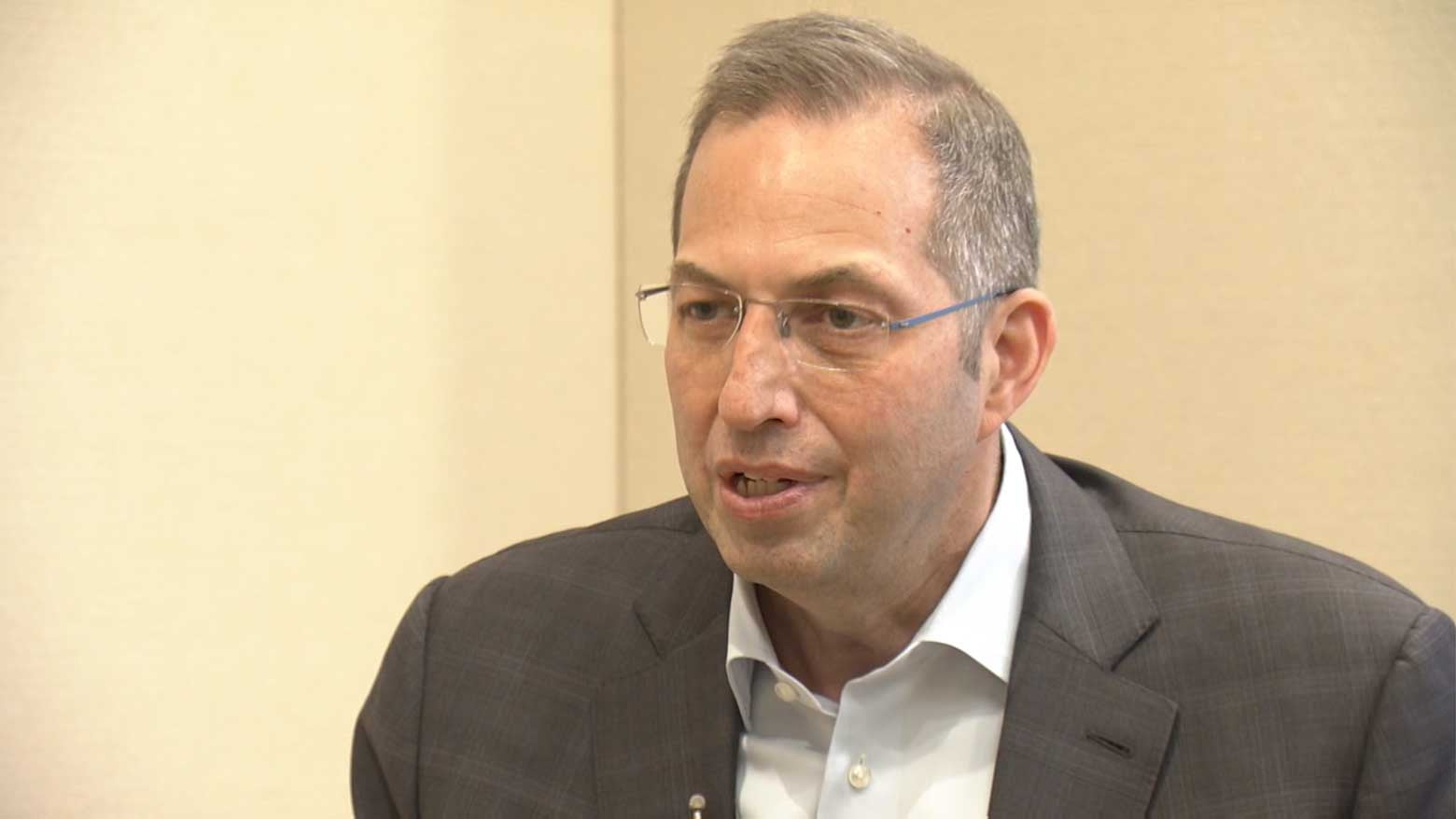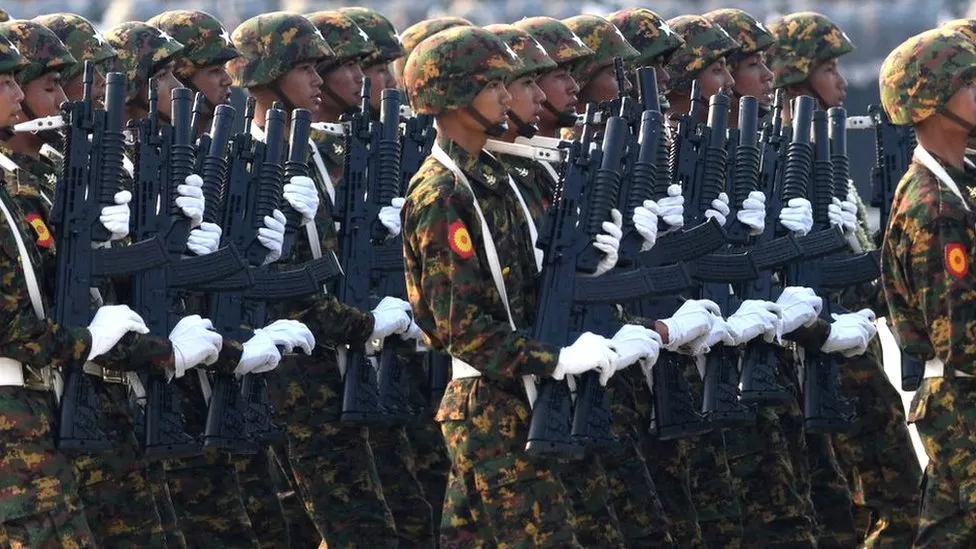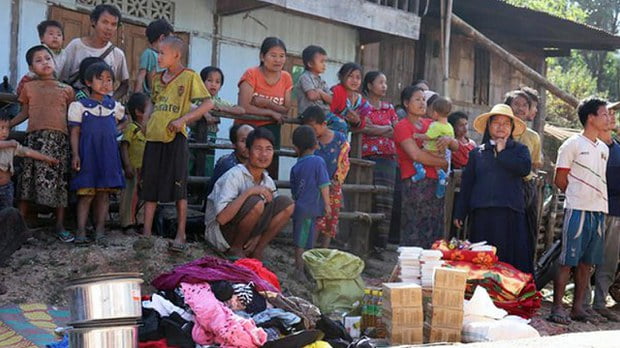Let us share an article from NHK World Japan’s Backstories.
NHK World Japan Backstoriesの記事、大変わかりやすいのでぜひご覧ください。和訳しました。
Myanmar’s fragile democracy came to a grinding halt in February 2021, when a military coup dismantled the country’s democratically elected government. In July, the junta executed four political prisoners, adding to the anguish and despair felt by those fighting for democracy. NHK sat down with the former US Ambassador to Myanmar, who condemned the military’s actions and warned that the situation there is no longer business as usual.
2021年2月、軍事クーデターによって民主的に選出された政府が解体され、ミャンマーの脆弱な民主主義は、停止した。7月には拘束中だった4人が処刑され、民主化のために戦う人々の苦悩と絶望はさらに深まった。NHKが行ったインタビューで、元駐ミャンマー米国大使は軍の行動を非難し、現地の状況はもはや通常通りではないと警告した。
“An absolute horror” ”恐ろしい事態”
Activists who fought for democracy alongside Nobel Peace Prize laureate Aung San Suu Kyi are now in hiding or behind bars. The military is suppressing opposition groups. As of mid-August, the number of civilian detainees stood at more than 12,000, according to the Assistance Association of Political Prisoners.
ノーベル平和賞受賞者のアウンサンスーチー氏と共に民主化のために戦った活動家たちは、現在、身を隠しているか、投獄されている。クーデター反対派に対する軍部の厳しい弾圧は続いており、AAPP(政治犯支援協会)によると、8月中旬時点で、民間人の拘束者は1万2千人以上にのぼる。
Former US Ambassador to Myanmar Derek Mitchell is now president of the National Democratic Institute, a non-profit organization working to strengthen democratic institutions around the world. He says the executions were “an absolute horror” that point to fragility among the military’s senior leaders.
元駐ミャンマー米国大使のデレク・ミッチェル氏は現在、世界中の民主主義制度の強化に取り組む非営利団体「National Democratic Institute」の代表を務めている。彼は、今回の処刑は「恐ろしい事態」であり、軍幹部が脆弱であることを示唆していると述べた。
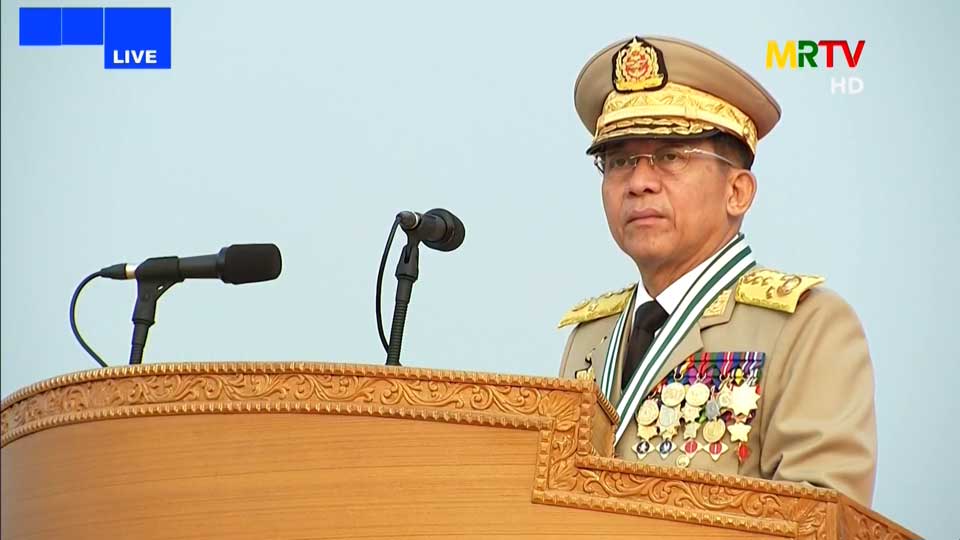
“There’s certainly a sense of insecurity,” Mitchell says. “The fact that they felt they needed to do these things, that they’re not controlling the country, that the coup has not gone the ways they expected, that the people are fighting back with everything they’ve got to defend their democracy and defend their human rights.” Mitchell says the military’s actions also reveal a sense of entitlement embedded in their thinking.
「不安の表れを感じます。」とミッチェル氏は言う。「軍がこうしたことをする必要があると感じたということは、彼らが国を支配していないということ、クーデターが彼らの期待通りに行かなかったということ、国民が民主主義を守り、人権を守るために全力で反撃しているということです。」また、軍の行動には、彼らの思考に埋め込まれた特権意識があることも明らかだと言う。
“(What we still see is) the sense that they are above any law, that they tell themselves they must preserve their privilege and their power under all circumstances.”
「自分たちはどんな法律よりも上位にあり、どんな状況でも自分たちの特権と権力を保たなければならないと言い聞かせていることが見て取れます。」
He adds, “This sense of entitlement, that they are born to rule and must impose their will, otherwise the country falls apart, it’s an arrogance, but it’s not based on anything except what they tell themselves. The only thing they’ve done for six decades, except the past 10 years, was to drive what should be the rice bowl of Asia, the hopeful part of Asia, into a basket case.”
ミッチェル氏はさらにこう続ける。「自分たちは統治する側に生まれてきたのだと言う権利意識があります。自分たちがトップに立たなければ国が崩壊してしまうと思い込んでいますが、それは傲慢で根拠がないことです。過去10年を除いて、60年間彼らがやってきたことは、アジアの米どころ、アジアの希望の星であるはずの国を、混乱に追いやったことだけです。」
Period of hope 希望の時代
From 2011 to 2012, Mitchell served as the first US Special Representative and Policy Coordinator for Burma, and then from 2012 to 2016 as the first US ambassador to the country in 22 years. He witnessed firsthand the former pariah state’s transition to democracy.
2011年から2012年まで、ミッチェル氏は米国初のビルマ特別代表兼政策調整官を務め、その後2012年から2016年まで、22年ぶりに駐ビルマ米国大使を務めた。そして、かつての傍流国家の民主化への移行を直接目撃している。
In 2011, former military general Thein Sein took office as president after the country’s first election in two decades. He launched a process of reform, which involved freeing hundreds of political prisoners, initiating talks with Aung San Suu Kyi, negotiating peace deals with ethnic minority groups and easing media censorship.
2011年、20年ぶりの選挙を経て、Thein Sein元軍人将軍が大統領に就任。数百人の政治犯の釈放、アウンサンスーチー氏との会談、少数民族との和平交渉、メディア検閲の緩和など、改革に着手した。
Acknowledging the change in Myanmar, Mitchell arranged a 2011 visit by then-US Secretary of State Hilary Clinton. The following year, he helped bring US President Barack Obama for talks with the military leaders and Aung San Suu Kyi on additional reforms.
ミャンマーの変化に注目したミッチェルは、2011年にヒラリー・クリントン米国務長官(当時)のミャンマー訪問を実現させた。翌年にはオバマ大統領を招き、軍部指導者やアウンサンスーチー氏とさらなる改革に向けた協議を行うよう支援した。
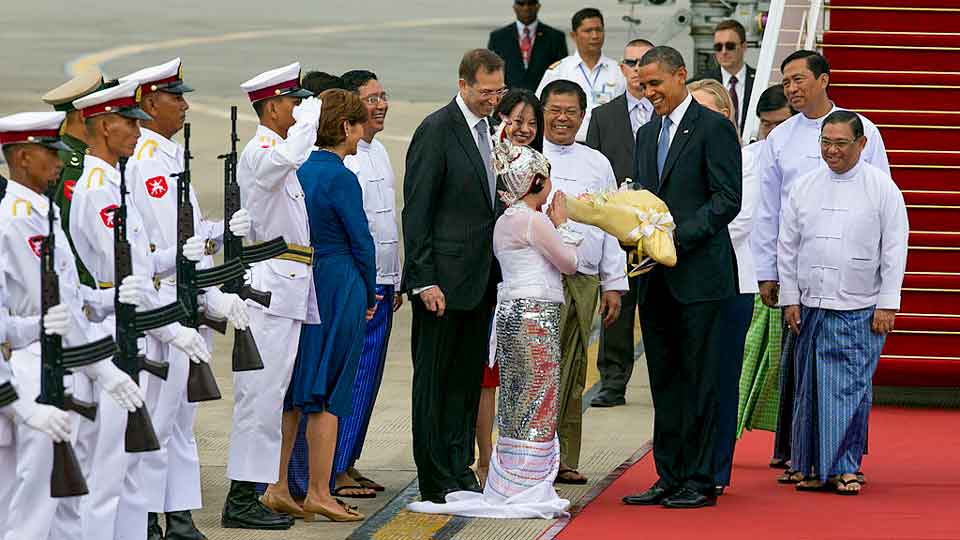
2012年、ヤンゴンでオバマ大統領とデレク・ミッチェル駐ミャンマー米国大使(当時)
During his visit, Obama promised a packed hall at Yangon University that “America will help rebuild an economy that can offer opportunity for its people and serve as an engine of growth for the world.” This commitment was part of his “rebalance to Asia” foreign policy platform, and signaled the start of a shift away from the former approach of sanctioning and isolating the country.
ヤンゴン大学を訪れたオバマ大統領は、満員の講堂で「国民に機会を提供し、世界の成長の原動力となるような経済の再建を、アメリカは支援します」と約束した。この約束は、「アジアへのリバランス」という外交方針の一環であり、かつての制裁や孤立化というアプローチからの転換の始まりを告げるものであった。
Major economies, including Britain, France, and Japan, quickly followed suit and government ministers and business officials were soon flowing into “Asia’s last frontier.” International hotels and high-end shopping malls replaced old hostels and food stalls in Yangon, the country’s largest city.
イギリス、フランス、日本などの主要経済国もすぐにこれに続き、政府閣僚やビジネス関係者が「アジア最後のフロンティア」に流れ込んできた。最大都市ヤンゴンには、古びたホステルや屋台に代わって、国際的なホテルや高級ショッピングモールが建ち並んだ。
“Our job is to stand with the people of Myanmar.”
“我々の役目は、ミャンマー国民の立場に寄り添うこと”
But today the situation in Myanmar is a far cry from that brief period of reform. Mitchell is calling on the international community to stand with the country’s people by engaging with the National Unity Government — the exile government formed by lawmakers and members of parliament ousted in the 2021 coup.
しかし、今日のミャンマーの状況は、あの短い改革期とはかけ離れたものになっている。ミッチェル氏は国際社会に対し、2021年のクーデターで追放された議員や国会議員によって形成された亡命政府であるNUG国家統一政府を支持し、同国の人々と共に立ち上がるよう呼びかけている。
“There is an elected representative here,” he says. “There was an election, and there are people that represent generally the will of the Myanmar people. And our job is to stand with the Myanmar people.”
「NUGこそ、国民に選ばれた代表団です」とミッチェル氏は言う。「選挙で選ばれた、一般のミャンマー国民の意思を代表する人たちです。我々の役目は、こうしたミャンマー国民の立場に寄り添うことです。」
Mitchell also says countries like the United States and Japan need to change their approach in dealing with the junta.
ミッチェル氏はまた、アメリカや日本などの国々は、軍政権に対処するためのアプローチを変える必要があると言う。
“We have to get out of our comfort zone, if we all go back and do what we’ve always done — America goes into sanctions, Japan does investment and engagement, India engages to try and balance China — it’s not going to get any results.”
「らくなやり方から抜け出さなければなりません。今まで通り、アメリカは制裁を行い、日本は投資と関与を行い、インドは中国との均衡を図るというやり方を続けても、何も変わりません。」
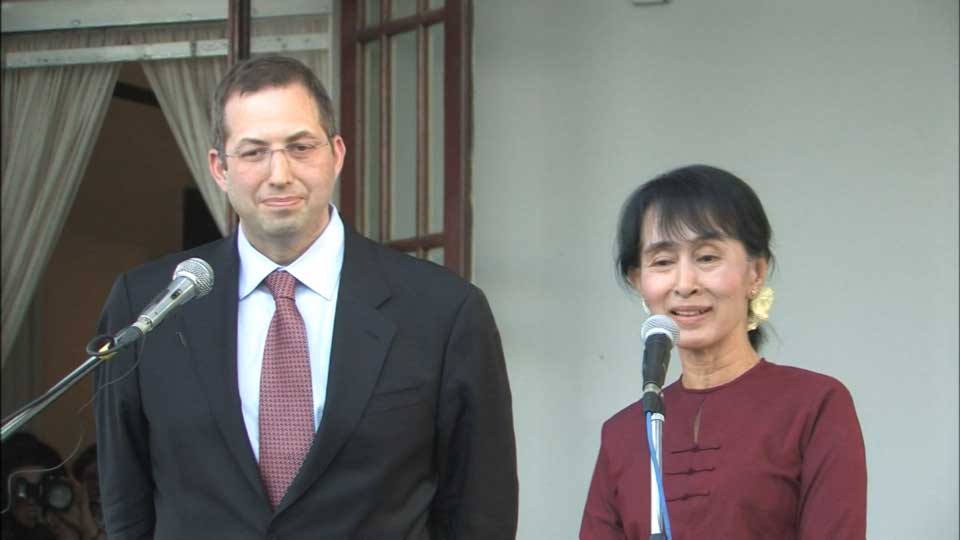
But Mitchell realizes this is easier said than done. Myanmar is located at a convergence point of competing geopolitical interests, strategically important both to the US pursuit of a “Free and Open Indo-Pacific” and China’s mega-infrastructure project, the “Belt and Road Initiative.” Washington does not want to antagonize the junta and risk Myanmar drawing closer into Beijing’s orbit. This is complicated by the fact that the US has had to allocate national security resources to dealing with Russia’s invasion of Ukraine. Mitchell says the US can no longer be counted on to act as the world’s sole policeman.
「言うは易く行うは難し」であることを、ミッチェル氏も理解している。ミャンマーは、地政学的な利害が対立する収束点に位置しており、「自由で開かれたインド太平洋」を追求する米国にとっても、中国の巨大インフラプロジェクト「一帯一路構想」にとっても戦略的に重要である。米国はミャンマー政府を敵に回し、ミャンマーが北京の軌道に乗ることを望んでいない。さらに米国は、ロシアのウクライナ侵攻への対応に国家安全保障のリソースを割かなければならないため、この問題は複雑化している。もはや世界の警察官としての役割を米国に期待することはできないと、ミッチェル氏は言う。
Quad and ASEAN
クアッドとASEAN
Instead, he believes it is incumbent on the Quad security framework, which Japan is a part of, to work together and stand up to the junta.
その代わり、日本も参加している安全保障の枠組み「クワッド」が協力して軍政権に立ち向かう必要があると、ミッチェル氏は考えている。
“I think the Quad is critical,” Mitchell says. “If we can find a way to squeeze the junta through the Quad, it demonstrates that it won’t be business as usual. We need to make sure the junta doesn’t get money. We still need to get humanitarian assistance through the right channels, but through civic channels and not the government channels.”
「クアッドは非常に重要です。」とミッチェルは言う。「もし、クアッドを通じて政権を圧迫する方法を見つけることができれば、これまでのようにはいかないと伝えることになります。軍政権が資金を得られないようにする必要がありますし、人道支援を届ける必要があります。軍政府のルートではなく、民間のルートを通じてです。」

Mitchell notes that Japan has a particularly important role to play because of its close historical and cultural ties to Myanmar. He says one way to exert pressure is for Japan’s Defense Ministry to stop accepting senior officers of Myanmar’s military as foreign students.
ミッチェル氏は、ミャンマーと歴史的・文化的に密接な関係にある日本が果たすべき役割は特に重要であると指摘。日本の防衛省がミャンマー軍幹部の留学生受け入れを中止することは、圧力をかける一つの方法だと言う。
“Until they demonstrate a commitment to military values, they shouldn’t get access,” Mitchell says. “They shouldn’t get the respect of engaging with real professional militaries at a time when they’re murdering their own people with impunity.”
「彼らが正しい軍隊の価値観に忠実であることを示すまでは、留学生を受け入れるべきではありません。自国民を平気で殺害している彼らに、防衛省と正式に関わるという名誉を与えるべきではないのです。」
Mitchell believes Myanmar’s fellow ASEAN members also have an important role to play. Since its founding, the bloc has historically adopted a policy of non-interference, where nations stay out of the internal affairs of other members. But Mitchell says that by staying silent ASEAN is empowering Myanmar’s military.
また、ミャンマーのASEAN加盟国も重要な役割を担っていると言う。ASEANはその創設以来、各国が他の加盟国の内政に干渉しない不干渉政策をとってきた。しかし、ミッチェル氏は、ASEANが沈黙することで、ミャンマー軍に力を与えていると指摘する。
“I hope that ASEAN, when they talk about sovereignty and non-interference, recognize that you interfere in internal affairs by empowering the military, empowering the junta, because sovereignty comes from the people,” he says.
「ASEANは主権や不干渉について語るが、ミャンマー軍部を強化し、軍政権を認めることで内政に干渉しているだと言うことを認識してほしい。主権は国民に由来するのだから」と彼は言う。
Mitchell admits there is no silver bullet for restoring democracy in Myanmar. He points to the diplomatic response to the previous junta, which was also divided — hardline isolation policy or soft line engagement. But what is starkly different today is that its people have had a glimpse of democracy over the past decade, only to see their hopes dashed. The reversal of democracy in Myanmar is not simply about geopolitical and economic concerns, but about crushing the country’s future.
ミャンマーの民主化に特効薬がないことは、ミッチェル氏も認めている。前の軍政権への外交対応も、強硬な孤立政策か、ソフトな関与か、分かれたと指摘する。しかし、現在と決定的に違うのは、ミャンマー国民が過去10年間に民主主義を垣間見たにもかかわらず、その希望を打ち砕かれたことである。ミャンマーにおける民主化の逆転現象は、単に地政学的、経済的な問題ではなく、この国の将来をつぶすものなのである。

